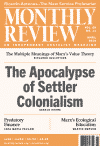Volume 69, Issue 11 (April 2018)

Building on Marx’s own open-ended critique, three revolutionary new developments have recently arisen in Marxist theory, addressing social reproduction, the expropriation of nature, and racial capitalism. | more…

From the sixteenth through the nineteenth centuries, millions of Africans and Native Americans were enslaved and traded by European settlers in the Americas. This story of slavery, colonialism, and emerging capitalism—and their handmaiden, white supremacy—is integral to that of modernity itself. | more…

From call centers to fast-food restaurants, the future of service work is one of precarious employment, with no stable schedules, wages, benefits, or union representation. Should these workers be considered part of a new service proletariat, or treated as a new class altogether, the “precariat”? | more…

The Marxian critique of political economy is inseparable from the “labor theory of value.” But what exactly does this theory mean? This article considers Marx’s value theory from five perspectives: as a monetary value theory, a theory of exploitation, a macro-monetary theory of capitalist production, a theory of individual prices, and a theory of crises. | more…

For several decades, intellectuals and economists who follow Marxist theory have hotly debated the financialization of capitalism. François Chesnais’s latest book represents the most thorough and polished attempt yet to clarify several lingering questions around the matter. | more…

Kohei Saito’s Karl Marx’s Ecosocialism: Capitalism, Nature, and the Unfinished Critique of Political Economy shows convincingly that Marx’s ideas about the interaction between humanity and nature did not arrive fully formed, but arose from his rigorous engagement with science and philosophy. His insights still offer unparalleled tools to understand capitalism’s current assault on the environment. | more…





